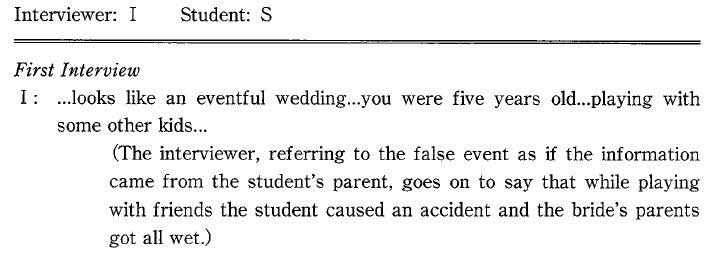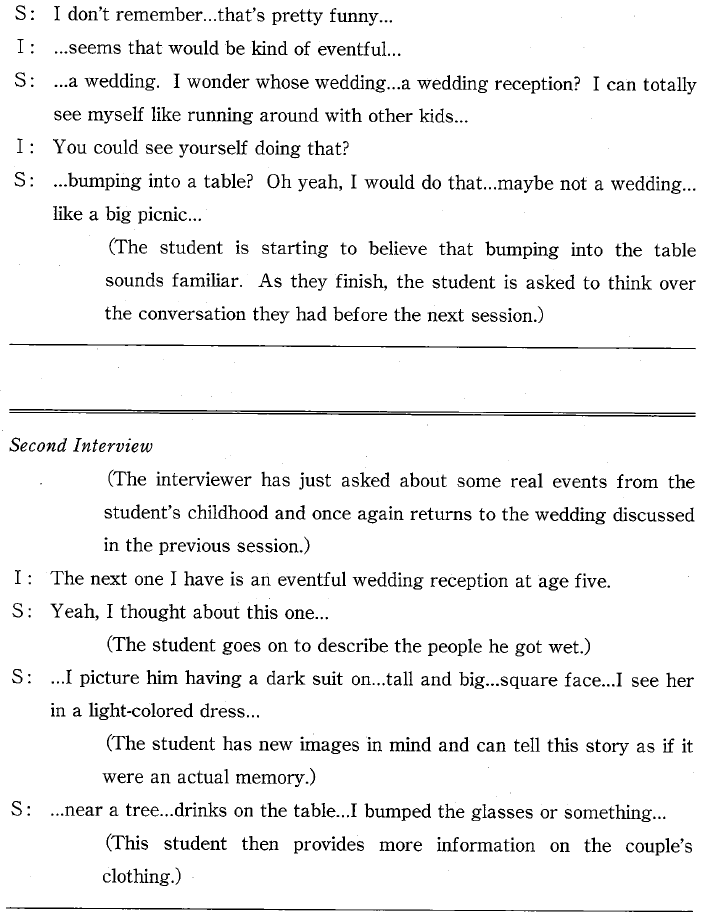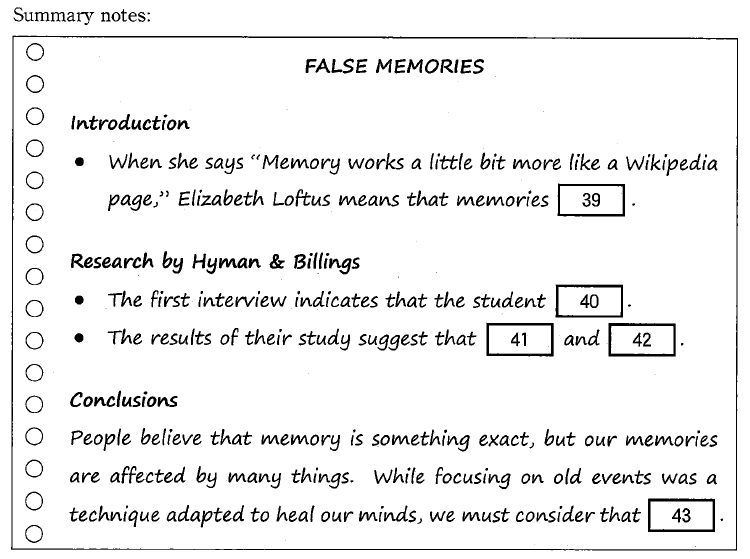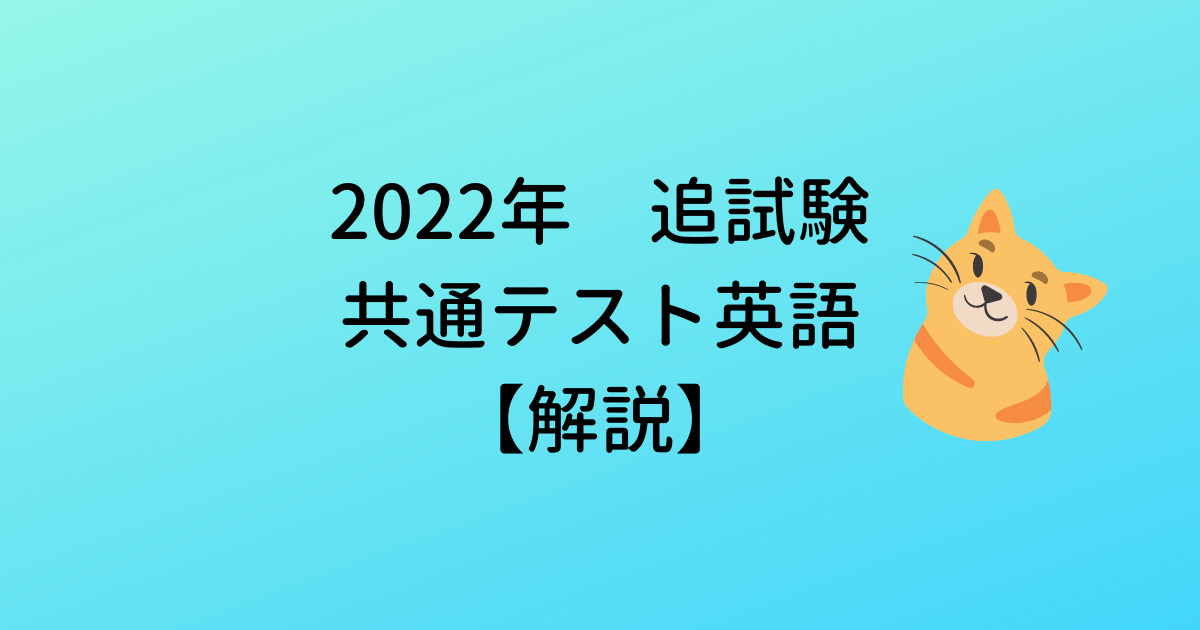2022年度の大学入学共通テスト追試験英語第6問Aの解説をしています。疑問点が残らないよう、解き方の手順も踏まえて一問一問どこよりも丁寧に説明します。
問題
Your study group is learning about “false memories.” One group member has made partial notes. Read this article to complete the notes for your next study meeting.
False Memories
What are memories? Most people imagine them to be something like video recordings to events in our minds. Whether it is a memory of love that we treasure or something more like failure that we fear, most of us believe our memories are a permanent record of what happened. We may agree that they get harder to recall as time goes on, but we think we remember the truth. Psychologists now tell us that this is not the case. Our memories can change or even be changed. They can move anywhere from slightly incorrect to absolutely false! According to well-known researcher Elizabeth Loftus, rather than being complete, correct, unchanging recording, “Memory works a little bit more like a Wikipedia page.” Anyone, including the original author, can edit the information.
Serious research investigating “false memories” is relatively new. Scholars Hyman and Billings worked with a group of college students. For this experiment, first, the students’ parents sent stories about some eventful episodes from their child’s youth to the interviewers. Using this family information, they interviewed each student twice. They mentioned some actual experiences from the person’s childhood; but, for their experiment, they add a made-up story about an eventful wedding, encouraging the student to believe actual conversations from the interviews of one student. Missing words are indicated by “…”; author’s comments by “( ).”


The students participating in this experiment came to believe that the false experiences the interviewers planted were absolutely true. By the second interview some students thought everything previously discussed was based on information from their parents about real events. This suggests that, when talking about memories, word choice makes a big difference in responses. Certain words lead us to recall a situation differently. Because the interviewer mentioned an “eventful” wedding several times, the student started having a false memory of this wedding.
Since the time of Sigmund Freud, called “the father of modern psychology,” mental therapy has asked people to think back to their childhood to understand their problems. In the late 20th century, people believed that recalling old memories was a good way to heal the mind, so there were exercises and interviewing techniques encouraging patients to imagine various old family situations. Now, we realize that such activities may lead to false memories because our memories are affected by many factors. It is not just what we remember, but when we remember, where we are when we remember, who is asking, and how they are asking. We may, therefore, believe something that comes from our imagination is actually true. Perhaps experts should start researching whether there is such a thing as “true memories.”

問1 Choose the best option to complete statement ( 39 ).
- are an account of one’s true experiences
- can be modified by oneself or others
- may get harder to remember as time goes by
- should be shared with others freely
問2 Choose the best option to complete statement ( 40 ).
- described all the wedding details to the interviewer
- knew about an accident at a wedding from childhood
- was asked to create a false story a wedding
- was unsure about something the interviewer said
問3 Choose the two best statements for ( 41 ) and ( 42 ). (the order does not matter.)
- false events could be planted easily in young children’s memories
- our confidence levels must be related to the truthfulness of our memories
- people sometimes appear to recall things that never happened to them
- planting false memories is frequently criticized by researchers
- the phrases used to ask about memories affect the person’s response
- when a child experiences an eventful situation, it forms stable memories
問4 Choose the best option for ( 43 ) to complete Conclusions.
- asking about our memories will help us remember more clearly
- the techniques on who, what, when, where, and how
- this mental therapy approach may be less helpful than we thought
- we have to work on our ability to remember events more precisely
解説 問1
Choose the best option to complete statement ( 39 ).
( 39 )の記述を完成させるのに最も適当な選択肢を選べ
( 39 )が含まれる文は、Introduction にある、この文です。
When she says “memory works a little bit more like a Wikipedia page,” Elizabeth Loftus means that memories ( 39 ).
彼女が「記憶の機能はウィキペディアのページに少し似ている」と言うとき、エリザベス・ロフタスはその記憶が( 39 )を意味します。
エリザベス・ロフタスは第一段落に出てきます。
According to well-known researcher Elizabeth Loftus, rather than being complete, correct, unchanging recording, “Memory works a little bit more like a Wikipedia page.” Anyone, including the original author, can edit the information.
有名な研究者エリザベス・ロフタスによると、完全で正確な不変の記録ではなく、「記憶の機能はウィキペディアのページに少し似ている」。もともとの著者を含め、誰でも情報を編集できます。
これを踏まえて選択肢を確認しましょう。
1. are an account of one’s true experiences
本当の経験の記録です
2. can be modified by oneself or others
自分自身、または他人が変更することができる
3. may get harder to remember as time goes by
時間が経つにつれて覚えにくくなるかもしれません
4. should be shared with others freely
他の人と自由に共有するべきだ
ウィキペディアに似ているということから、「4」を考えてしまうかもしれません。ウィキペディアは誰でも見ることができますからね。
しかしウィキペディアを例に出した本質が「誰でも編集できる」ことですので、「4」は違います。これに当てはまるのは、「2」です。ということで、正解は「2」です。

ウィキペディアを見たことがある人は多いと思います。ですが、それが誰でも編集できると知っている人はそれほど多くないかもしれません。これを知っていると、この問題は解きやすいですね。
解説 問2
Choose the best option to complete statement ( 40 ).
( 40 )の記述を完成させるのに最も適当な選択肢を選べ
( 40 )が含まれる文は、Research by Hyman & Billings にある、この文です。
The first interview indicates that student ( 40 ).
最初のインタビューは、生徒が( 40 )ということを示しています。
インタビューは二回ありますが、最初の方を読んで答える問題です。選択肢を確認しましょう
1. described all the wedding details to the interviewer
インタビュアーに結婚式の詳細すべてを説明しました
「結婚式の話」は、First Interview にこうあります。
…looks like an eventful wedding…you were five years old…playing with some other kids…
…波乱万丈の結婚式のように見えます…あなたは5歳でした…他の子供たちと遊んでいます…
結婚式での出来事を説明していますが、この話をしているのはインタビュアーです。生徒ではありません。この選択肢は違います。
2. knew about an accident at a wedding from childhood
子供の頃から結婚式でのアクシデントを知っていた
「結婚式のアクシデント」は、First Interview にこうあります。
(The interviewer, referring to the false event as if the information came from the student’s parent, goes on to say that while playing with friends the student caused an accident and the bride’s parents got all wet.)
(インタビュアーは、情報が生徒の親からのものであるかのように誤った出来事に言及し、友人と遊んでいる間に生徒がアクシデントを引き起こし、花嫁の両親がずぶ濡れになった、とさらに続けます)
結婚式でのアクシデントは、作り話です。しかもインタビュアーから生徒に伝えたものです。この選択肢は違います。
3. was asked to create a false story a wedding
結婚式の偽りの物語を作成するように頼まれました
「偽りの物語」は、First Interview の前の段落にこうあります。
but, for their experiment, they add a made-up story about an eventful wedding, encouraging the student to believe the fake wedding had really happened.
しかし彼らの実験では、波乱に満ちた結婚式について、でっち上げの話を追加し、偽の結婚式が実際に起こったと学生に信じ込ませました。
偽りの物語を作ったのはインタビュアー自身です。そしてその目的は、生徒をその偽りの物語でだまそうとするものです。生徒は偽りの物語を作成するように頼まれていません。この選択肢は違います。
4. was unsure about something the interviewer said
インタビュアーが言ったことについて、確信が持てなかった
インタビュアーが結婚式でのアクシデントについて話した時、こう答えています。
I don’t remember… that’s pretty funny…
覚えてない…それはかなり面白い…
覚えていないと言っています。この選択肢が正解です。ということで、正解は「4」です。

空所がある文に The first interview とありますので、見るべき場所は分かりやすいですね。
解説 問3
Choose the two best statements for ( 41 ) and ( 42 ). (the order does not matter.)
( 41 )と( 42 )に対して、一番良い記述を二つ選択してください。 (順序は関係ありません。)
( 41 )と( 42 )が含まれる文は、Research by Hyman & Billings にある、この文です。
The results of their study suggest that (41) and (42).
研究の結果は( 41 )と( 42 )を示しています。
選択肢を確認しましょう。
1. false events could be planted easily in young children’s memories
誤った出来事は子供のころの記憶に簡単に植え付けられるかもしれない
確かに実験で、誤った記憶を植え付けることができています。ですが、この実験のテーマは記憶を改ざんすることでしょうか。このような記述があります。
Now, we realize that such activities may lead to false memories because our memories are affected by many factors.
今、私たちの記憶は多くの要因の影響を受けるため、そのような活動は誤った記憶につながる可能性があることを認識しています。
いろいろな要因で記憶が変わってしまうことがある、ということがテーマです。そう考えるとこの選択肢の内容は、間違ってはいませんが、少し不安があります。保留にしておきましょう。
2. our confidence levels must be related to the truthfulness of our memories
私たちの信頼レベルは私たちの記憶の真実性に関連していなければなりません。
なんかそれっぽいことが書いてありますけれど、よくわかりませんね。このような記述は本文にありませんでした。この選択肢は違います。
3. people sometimes appear to recall things that never happened to them
人々は時々彼らに決して起こらなかったことを思い出すようになります。
Second Interview にこうあります。
…I picture him having a dark suit on…tall and big…square face…I see her in a light-colored dress…
…私は彼が暗いスーツを着ているのを想像します…背が高くて大きい…正方形の顔…私は彼女が明るい色のドレスを着ているのを見ます…
(The student has new images in mind and can tell this story as if it were an actual memory.)
生徒は新しいイメージを念頭に置いており、実際の記憶であるかのようにこの物語を語ることができます。
起こらなかったことを思い出していますね。そして、こうも書いてあります。
The students participating in this experiment came to believe that the false experiences the interviewers planted were absolutely true.
この実験に参加した学生たちは、インタビュアーが植え付けた誤った経験は絶対に真実であると信じるようになりました。
この選択肢が正解です。
4. planting false memories is frequently criticized by researchers
虚偽の記憶を植えつけることは、研究者によって頻繁に批判されます
批判的な話は、本文にこうあります。
Now, we realize that such activities may lead to false memories because our memories are affected by many factors.
今、私たちの記憶は多くの要因の影響を受けるため、そのような活動は誤った記憶につながる可能性があることを認識しています。
かつて行われていた記憶を思い出させるテクニックが、正しくないのではないかという批判です。虚偽の記憶を植えつけることの是非ではありません。この選択肢は違います。
5. the phrases used to ask about memories affect the person’s response
記憶について質問するために使用されるフレーズは、人の反応に影響を与えます
本文にこうあります。
This suggests that, when talking about memories, word choice makes a big difference in responses.
これは、記憶について話すとき、単語の選択が反応に大きな違いをもたらすことを示唆しています。
さらにこうあります。
Certain words lead us to recall a situation differently.
特定の言葉は、私たちに状況を違って思い出させるように導きます。
質問するときの言葉によって、記憶が変わるという話ですね。この選択肢が正解です。
6. when a child experiences an eventful situation, it forms stable memories
子供が波乱に満ちた状況を経験するとき、それは安定した記憶を形成します
そのような話はありませんでした。この選択肢は違います。ということで、正解は「3」「5」です。

選択肢「2」には、must という助動詞が選択肢に入っています。表現として少しきついので、その時点で違うかもと、疑ってみてもいいかもしれません。「1」は内容としては正しいですが、best な選択肢かと言われるとなぁ…という感じですね。
解説 問4
Choose the best option for ( 43 ) to complete Conclusions.
Conclusions を完成するのに( 43 )に最適な選択肢を選べ。
( 43 )を含む Conclusions の文を見てみましょう。
People believe that memory is something exact, but our memories are affected by many things. While focusing on old events was a technique adapted to heal our minds, we must consider that ( 43 ).
人々は記憶は正確なものだと信じていますが、私たちの記憶は多くの影響を受けます。古い出来事に焦点を当てることは、私たちの心を癒すために適応された技術でしたが、私たちは( 43 )を考慮しなければなりません。
選択肢を確認しましょう。
1. asking about our memories will help us remember more clearly
記憶について尋ねることは、私たちがより明確に思い出すのに役立つだろう
インタビューの例からも、尋ね方によって記憶が変わってしまうことがあります。この選択肢は違います。
2. the techniques on who, what, when, where, and how
誰が、何を、いつ、どこで、どのように行うかに関するテクニック
最終段落にこうあります。
It is not just what we remember, but when we remember, where we are when we remember, who is asking, and how they are asking.
それは私たちが何を思い出すかだけではなく、いつ思い出すか、思い出すときの場所、誰が尋ねているのか、そしてどのように質問するかです。
これはテクニックではなく、これらの要因によって記憶が影響を受けるという話です。この選択肢は違います。
3. this mental therapy approach may be less helpful than we thought
このメンタルセラピーのアプローチは、私たちが思っていたよりも役に立たないかもしれない
最終段落に、こうあります。
In the late 20th century, people believed that recalling old memories was a good way to heal the mind, so there were exercises and interviewing techniques encouraging patients to imagine various old family situations. Now, we realize that such activities may lead to false memories because our memories are affected by many factors.
20世紀後半には、昔の思い出を思い出すことが心を癒す良い方法だと人々は信じていたので、患者にさまざまな昔の家族の状況を想像させる運動や面接のテクニックがありました。今、私たちの記憶は多くの要因の影響を受けるため、そのような活動は誤った記憶につながる可能性があることを認識しています。
昔のことを思い出させようとしても、誤った記憶になる可能性があります。この選択肢が正解です。
4. we have to work on our ability to remember events more precisely
出来事をより正確に記憶する能力に取り組む必要があります
最終段落にこうあります。
Perhaps experts should start researching whether there is such a thing as “true memories.”
おそらく専門家は、「本当の記憶」のようなものがあるかどうかを調査し始めるべきです。
様々な要因によって記憶が変わってしまいます。なので「本当の記憶」があるのだろうか、というのが結論です。正確に記憶するために、何かをしようという話ではありません。この選択肢は違います。
ということで、正解は「3」です。

( 43 )を含む文の最初に「While / ~とはいえ」があります。while は文頭に置いて、譲歩の従属節を導きます。つまり( 43 )には「古い出来事に焦点を当てることは、私たちの心を癒すために適応された技術でした」と対比する内容がくると予想されます。



コメントをどうぞ
昨日に引き続いてのメールで失礼します。
第6問Aの問2の選択肢③についての問題の本文抜き出しと日本語訳とにミスがあるようです。
ご確認の上、ご検討下さい。
具体的には
「but, for their experiment, they add a made-up story about an eventful wedding, encouraging the student to believe」
の先が本文の次の行を写しているようで、次のようになっています。
「 actual conversations from the interviews of one student.」
その結果、日本語訳でも次の『』部分が誤っていると思います。
「しかし実験のために、彼らは波乱に富んだ結婚式の作り話を追加し、『1人の学生のインタビューからの実際の会話』を信じるように学生を促します。」
以上です、
とてもありがたいサイトだけに、
修正した方が良いように思ってメールしました。
失礼します。
修正しました。ご指摘ありがとうございます。